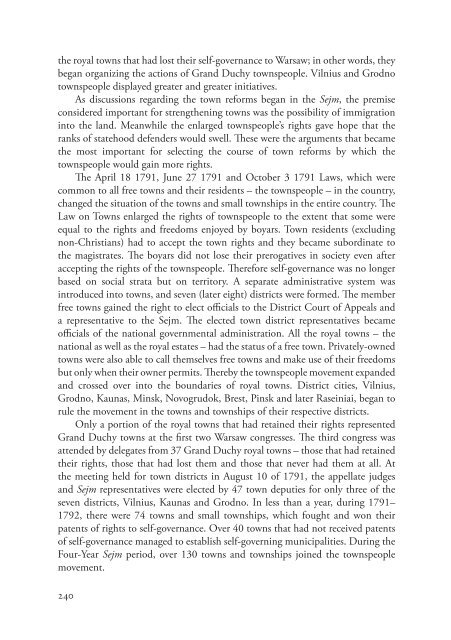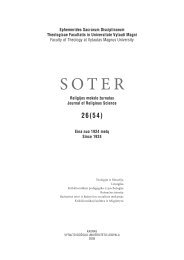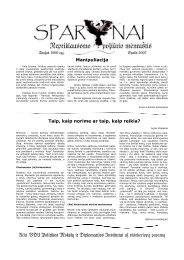Untitled - Vytauto Didžiojo universitetas
Untitled - Vytauto Didžiojo universitetas
Untitled - Vytauto Didžiojo universitetas
Create successful ePaper yourself
Turn your PDF publications into a flip-book with our unique Google optimized e-Paper software.
the royal towns that had lost their self-governance to Warsaw; in other words, they<br />
began organizing the actions of Grand Duchy townspeople. Vilnius and Grodno<br />
townspeople displayed greater and greater initiatives.<br />
As discussions regarding the town reforms began in the Sejm, the premise<br />
considered important for strengthening towns was the possibility of immigration<br />
into the land. Meanwhile the enlarged townspeople’s rights gave hope that the<br />
ranks of statehood defenders would swell. These were the arguments that became<br />
the most important for selecting the course of town reforms by which the<br />
townspeople would gain more rights.<br />
The April 18 1791, June 27 1791 and October 3 1791 Laws, which were<br />
common to all free towns and their residents – the townspeople – in the country,<br />
changed the situation of the towns and small townships in the entire country. The<br />
Law on Towns enlarged the rights of townspeople to the extent that some were<br />
equal to the rights and freedoms enjoyed by boyars. Town residents (excluding<br />
non-Christians) had to accept the town rights and they became subordinate to<br />
the magistrates. The boyars did not lose their prerogatives in society even after<br />
accepting the rights of the townspeople. Therefore self-governance was no longer<br />
based on social strata but on territory. A separate administrative system was<br />
introduced into towns, and seven (later eight) districts were formed. The member<br />
free towns gained the right to elect officials to the District Court of Appeals and<br />
a representative to the Sejm. The elected town district representatives became<br />
officials of the national governmental administration. All the royal towns – the<br />
national as well as the royal estates – had the status of a free town. Privately-owned<br />
towns were also able to call themselves free towns and make use of their freedoms<br />
but only when their owner permits. Thereby the townspeople movement expanded<br />
and crossed over into the boundaries of royal towns. District cities, Vilnius,<br />
Grodno, Kaunas, Minsk, Novogrudok, Brest, Pinsk and later Raseiniai, began to<br />
rule the movement in the towns and townships of their respective districts.<br />
Only a portion of the royal towns that had retained their rights represented<br />
Grand Duchy towns at the first two Warsaw congresses. The third congress was<br />
attended by delegates from 37 Grand Duchy royal towns – those that had retained<br />
their rights, those that had lost them and those that never had them at all. At<br />
the meeting held for town districts in August 10 of 1791, the appellate judges<br />
and Sejm representatives were elected by 47 town deputies for only three of the<br />
seven districts, Vilnius, Kaunas and Grodno. In less than a year, during 1791–<br />
1792, there were 74 towns and small townships, which fought and won their<br />
patents of rights to self-governance. Over 40 towns that had not received patents<br />
of self-governance managed to establish self-governing municipalities. During the<br />
Four-Year Sejm period, over 130 towns and townships joined the townspeople<br />
movement.<br />
240





